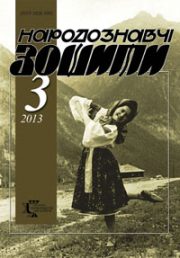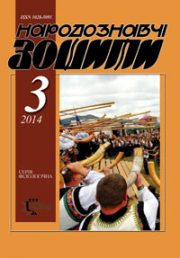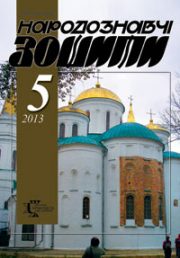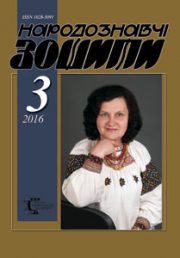The Ethnology Notebooks. 2019, № 4 (148), 811—817
УДК 801.8:398.81(=161.2)]-057.
DOI https://doi.org/10.15407/nz2019.04.811
4(477)”19/20″ Г.Дем’ян
THE REBEL SONG IN GRIGORIA FOLKLOR STUDIES OF HRYHORI DEMIAN
SOKIL Hanna
ORCID ID: https://orcid.org/0000-0002-8352-2124,
Doctor of Philological Sciences, Professor,
Ivan Franko National University of Lviv,
Universytetska Street 1, 79000, Lviv, Ukraine.
Contacts: e-mail: gan.sokil@gmail.com
Abstract. In the proposed investigation author sets the goal to investigate heritage of famous Ukrainian folklorist, historian, active public figure, and ethnographer Gregory Demian, scientific achievements of this topic research. The object of the research is his scientific articles and monographs «Ukrainian rebel songs of 1940—2000 years», «Stepan Bandera and his family in folk songs, retellings and memoirs» and others, the subject of the research — conceptual positions of the scientific research.
Demian was one of the first in Ukraine who has discussed openly the scientific problems of the history of national liberation struggles of the twentieth century, studying it comprehensively alongside with the oral history of the people. The relevant materials were actively published by the scientist in various periodicals («Folk Art and Ethnography», «Liberation Road», «Will and the Motherland», «Statehood», «Way of Victory» and others).
He realized folklore studios of folk songs systematically and comprehensively, starting from the recording of texts and melodies, publications of collected songs and completing scientific and theoretical comprehension. As a professional researcher, he studied in detail all that was done before him — from the early publications of the texts of rebel songs that appeared on the pages of underground publications of the 1940—1950s. As a folklorist, G. Demian strictly adhered to the developed scientific principles regarding recordings and publications of popular poetic texts, developed criteria for the delimitation of the terminology of insurgent songs, substantiated the use of other variants of their names, initiated a genre classification, highlighted the main thematic cycles and motives. The rebel songs are an important area of scientific studies by G. Demian, he remains the most authoritative researcher of them.
Keywords: folk songs, folklore, researcher, publications, genre classification, terminology.
Received 2.06.2019
REFERENCES
Myshanych, S. (2003). Talented carriers and creators of folklore. In S. Mishanych. Folklore and literary works (Vol. 2, pp. 187—231). Donets’k [in Ukrainian].
Kostyk, V. (2003). Two rebel songs from Verenchanka. Bukovinsky magazine, 1, 173—177 [in Ukrainian].
Lun’o, Ye. (2003). Fundamental research of rebel songs. Review: Hryhori Demian Ukrainian rebel songs of 1940—2000: historical and folklore research. Vyzvol’nyj shliakh, 6, 120—122 [in Ukrainian].
Sokil, H. (2014). The researcher of the spiritual treasure of the nation (to the 85th anniversary of Hryhorii Demian’s birth). Mifolohiia i fol’klor, 3—4, 79—86 [in Ukrainian].
Dzoban, O. (1999). Materials for the history of the OUN-UPA in the funds of the manuscripts department of the Lviv Scientific Library named after. V. Stefanyk of the National Academy of Sciences of Ukraine. Vyzvol’nyj shliakh, 6, 717—734 [in Ukrainian].
Stets’ko, S. (1995). «The guarantee of national security is its own strength»: Report of the Chairman of the Congress of Ukrainian Nationalists. Vyzvol’nyj shliakh, 10, 1155—1161 [in Ukrainian].
Demian, H. (1995). Vydannia ukrains’kykh povstans’kykh pisen’. In Memoirs of the Shevchenko Scientific Society: Works of the section of ethnography and folklore (Vol. 230, pp. 578—587) [in Ukrainian].
Demian, H. (2003). Ukrainian rebel songs of 1940—2000 years (historical and folklore research). Lviv [in Ukrainian].
Demian, G. (Ed.). (2006). Stepan Bandera and his family in folk songs, retellings and memoirs. Lviv [in Ukrainian].
Demian, H. (1992). Twenty-five rebel songs. Ukraine in the Past (Issue 3, pp. 10—42). Kyiv; L’viv [in Ukrainian].
Demian, H., Lavryshyn, Z. (Ed.). (2001). Review: UPA Songs. With prefase in English. Litopys Ukrayins’koyi Povstans’koyi Armiyi (Vol. 25). Toronto: Litopys UPA, 1996; L’viv: Spilne ukrains’ko-kanads’ke pidpryiemstvo «Litopys UPA». In Memoirs of the Shevchenko Scientific Society. Works of the section of ethnography and folklore (Vol. 242, pp. 634—643) [in Ukrainian].







